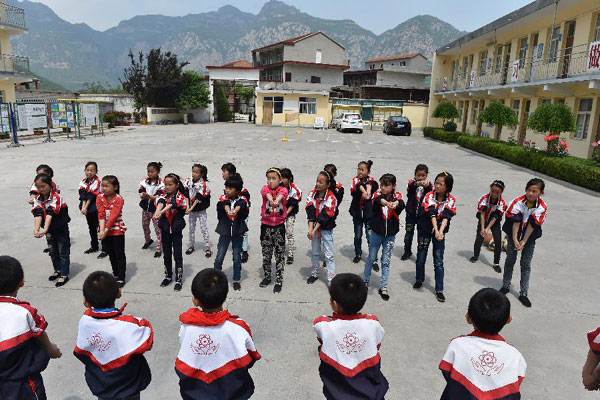Premier Li calls to avoid deaths of left-behind children
(chinadaily.com.cn) Updated: 2015-06-12 17:11
|
 |
| Boarders have a PE class at the primary school of Shicheng Township of Pingshun County, north China's Shanxi province, May 26, 2015. The children in the school are mostly left behind children whose parents work outside of their hometown. [Photo/Xinhua] |
Premier Li Keqiang gave instructions on Friday concerning the case of four left-behind siblings in Bijie, Guizhou province, who died after drinking pesticide.
He asked for greater supervision of children to avoid similar tragedies.
The four, aged 5 to 13, consumed pesticide at their home in Cizhu, a village in the city's Qixingguan district at about 11 pm on Tuesday in an apparent suicide attempt and later died in a hospital, police said.
The children had been without parental care since March after their father, Zhang Fangqi, left to take a job far from home. Their mother, Ren Xifen, had left home in March last year after a bitter feud with her husband.
Premier Li asked relevant departments to ensure that the country's temporary assistance system is put into place whenever required. He said relevant departments should make efforts to investigate the inaction of some government officials and punish those responsible.
Such a tragedy should never happen again, the Premier said.
The Bijie government said that it had begun an investigation and that several officials had already been punished.
Nie Zongxian, Party secretary of the Tiankan Township of Qixingguan District in Bijie City, and Chen Mingfu, township head, have both been dismissed. Yang Qian, deputy head of the district government, has been suspended, Party committees of Bijie and Qixingguan announced. Also suspended were Ye Rong, head of the district's education bureau, and Xue Tingmeng, an official of the Tiankan Township.
Local government has contacted the mother of the dead and sent people to pick her up, according to an official announcement issued this morning, Beijing-based The Mirror reported on Friday.
The father said to the media on Friday that he knew what had happened and would go back home tomorrow, the report said.
The deaths come two and a half years after an incident in which five street children were found dead in the trash in Bijie. The five, found more than a week after they disappeared, had lit a fire to stay warm on the night of Nov 15, 2012, before they died from carbon monoxide poisoning, police said.
The Bijie city government said after the 2012 incident that it would launch a special fund of 60 million yuan ($9.7 million) each year to help children who are left without parental care.
Bijie Mayor Chen Changxu said in November 2012 that the incident that year had exposed vulnerabilities in the city's social management and the care of "left-behind" children.
Chen vowed that the city would establish an archive system to keep track of all children without parental care and would ensure that no children were left on the streets.
However, Tang Jun, a social policy researcher at the Chinese Academy of Social Sciences, said Tuesday's incident "showed that the government intervention measures have failed. The role of parents cannot be replaced, and the best way is to ensure that the children go with their parents as they migrate to other cities to work".
"For decades, we have merely required a workforce from the migrant workers. If we do not provide them with more social benefits, similar cases will take place again and again," he said.
Li Yifei, deputy director of the Scientific Communication and Education Research Center at Beijing Normal University, said "left-behind" children have a much bigger chance of experiencing psychological problems.
"Intervention would also be difficult because normally the children would not display abnormal behavior, even if you try to ask questions. However, they generally evade or react strongly to questions about their parents," he said.
The role of teachers can also be crucial, he said. "Teachers should receive psychological training to monitor the mental state of children. The key is to identify the children who might have mental problems and ensure that there will be intervention in time.”
"However, there are few teachers or psychological workers in regions where the left-behind children are concentrated," he said.
- Latest deaths expose plight of China's 'left-behind' children
- Left-behind children celebrate Children's Day
- Tragedy highlights plight of left-behind elderly
- Government calls attention to children left behind in rural areas
- Guizhou to build 1,000 left-behind children service centers
- Looking after the kids 'left behind'
- Govt encourages people to work 4.5 days a week
- Action to be taken as HIV cases among students rise
- Debate grows over reproductive rights
- Country's first bishop ordained in 3 years
- China builds Tibetan Buddhism academy in Chengdu
- Authorities require reporting of HIV infections at schools
- Typhoon Soudelor kills 14 in East China
- Police crack down on overseas gambling site
- Debate over death penalty for child traffickers goes on
- Beijing to tighten mail security for war anniversary







